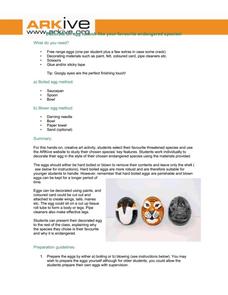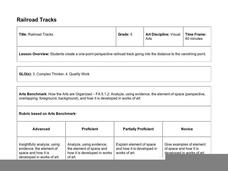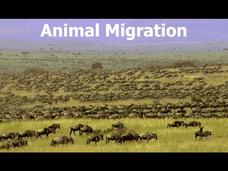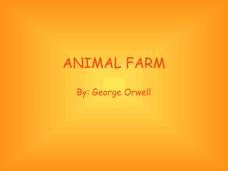Curated OER
Animal Biotechnology
The roles of animals in biotechnology and the animal products that we use are described on these slides. Students will be interested by the different options given about culturing animal tissues and components of non-living systems. This...
Curated OER
Fine Art to Animation With Keith Haring
Learners examine artwork and Flip Books by Keith Haring. They analyze elements of line and color through drawing and create their own morphes using a computer animation marker.
Curated OER
Animal Adjectives
For this reading and writing worksheet, students read 3 stories about farm animals that have acted intelligently or even heroically. Students think of 2 adjectives that describe the animal in the story and write them on the lines.
Curated OER
Animal Poetry
Fourth graders write poems that use local wildlife as their inspiration. After a class discussion which produces a list of wildlife that pupils have seen in their town, a review of three types of poetry ensues. They look at how...
K12 Reader
Adapting to Survive
Life science and language arts come together in a passage about animal adaptation. After kids learn about how organisms adapt to conditions in their environments, they complete five reading comprehension questions based on context clues...
ARKive
Endangered Animal Easter Eggs
I love any lesson that addresses more than one subject area. You and your class will discuss endangered animals; each child will choose one animal and then create a decorated egg to represent their animal. After the eggs are decorated,...
McGraw Hill
Arthropods
Are spiders related to crabs? Study the order of arthropods with a reading selection about animal diversity. It provides details about each class within the order, as well as vivid pictures and explanatory charts.
American Museum of Natural History
Identification Adventure
Put all the pieces together. After a skeleton is put together, pupils play the scientist to determine the type of animal they have by using a classification tree to narrow down the identity. After each decision, they gain advice from an...
Cornell University
Plant Cell Crime Scene
Use science to solve the mystery of the Poplar murder. Pupils use forensic botany to determine if a suspect could be the killer. By analyzing images from a Transmission Electron Microscope, learners determine if the material found on the...
Global Oneness Project
The Consciousness of Nature
Scholars voice their opinions about animal consciousness with an article that challenges common ideas about nature. After reading the article, learners engage in a thoughtful discussion before writing out their arguments...
Curated OER
The Human-Animal Bond
Youngsters read about the bond between some animals and humans and how animals help us out. Unusual examples are given: honey-guide birds, dolphins that shepherd fish for fishermen, landmine-locating rats, and piranhas that give...
Google
Animation: Studio Logo
Logos just make a club seem more fun. Scholars incorporate knowledge from previous lessons in the unit to write a computer program in the Scratch block-based language. Their program should help design a logo for the CS First studio. A...
Hawaiʻi State Department of Education
Railroad Tracks
Ahhh the vanishing point! Sounds ominous, but it's not. Fifth graders analyze the use of perspective in Renaissance art. They practice using linear perspective to draw railroad tracks that seem to go on forever. Tip: Make this...
ARKive
Animal over Winter
Gosh those polar regions can get cold. So, how do the animals that live there survive the long winters? Learners explore how animals adapted to survive harsh wintry conditions by completing a worksheet and comparing animal survival...
University of Washington
Animal Migration
Here is a unique resource to use with middle and high schoolers that deals with animal migration. Viewers discover the reasons for, types of, and animals that practice this behavioral adaptation. Specific animals that are introduced...
CK-12 Foundation
Slope-Intercept Form of Linear Equations: Cable Car Tracks
Get on track to learn about slope-intercept form. Scholars use an interactive to position a line along the tracks of cable car. Applying knowledge of slope and intercepts, they write the slope-intercept form of the equation for the line.
Curated OER
Animal Farm by George Orwell
Without a clear purpose, this resource would be tricky to use in a classroom. It is meant to be a review of the book Animal Farm by George Orwell, but it is confusing. There are bits of information related to the book on each slide, but...
Curated OER
Animal Signs Word Search
Although this animal and environment word search has little educational merit, it may serve as a vocabulary review tool for scholars new to these terms. The words students must find include camouflage, interdependent, muskrat, food...
Curated OER
Animal Tracks
Second graders study the different tracks that animals make. They identify similarities and differences in the tracks and formulate opinions based on facts.
Curated OER
Animal Families
In this animal families worksheet, students match the name of a baby animals to the adult name. Next, they match the name of the animal to the name of its animal group, such as herd, pack, gaggle, etc. There are 15 baby animal names,...
Curated OER
My Animal Book
Don't you just love resources you can print and use? Here is a complete printable packet all about animals. Kids can color the animal pictures, answer animal questions, and complete the animal crossword puzzle, then put them all together...
Curated OER
Animal Habitats
Students explore animal lifestyles by researching their characteristics. In this animal habitat lesson, students read the story Over in the Jungle and analyze the animal illustrations in the book. Students create clay animal characters...
Curated OER
Bring Your Character in a Bag - Animal Farm (Middle, Literature)
Ninth graders interpret a chosen character from the novel Animal Farm and represent that character in original symbolic form and present orally to the class.
Curated OER
Total English Pre-intermediate: Name That Animal!
In this animal vocabulary activity, students consolidate animal vocabulary as they respond to 15 short answer questions and discuss 3 questions regarding animals and idioms.
Other popular searches
- Clay Animation
- Animation Webquest
- Flash Animation
- Physics Flash Animation
- Flip Book Animation
- Computer Animation
- Ozone Depletion Animation
- Stop Motion Animation
- Density Animation
- Animation Season
- Cell Animation
- Clay Animation Movie























